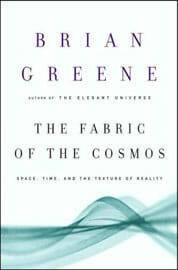
G.K. Chesterton, in his wonderful “A Defense of Nonsense,” argued that the gibberish rhymes of 19th-century writers like Edward Lear and Lewis Carroll are implicitly religious: “So long as we regard a tree as an obvious thing … we cannot properly wonder at it.” Nonsense literature undermines this obviousness by injecting “elvish dialect” into “simple and rational statements,” mixing the prosaic with the crazy and rendering the world—and its creator (if any)—interesting again.
Physicist Brian Greene’s books of science popularization, such as the Pulitzer-nominated The Elegant Universe, have an effect similar to that of nonsense literature: he writes clear, straightforward prose about mind-boggling facts. Elegant Universe covered string theory—the idea that basic units of matter are vibrating strings of energy, the character of their vibration determining the kind of particle they become. Greene’s most recent work, The Fabric of the Cosmos, deals with our evolving understanding of spacetime, involving string theory only secondarily. Beginning with the argument between Newton and Leibniz on the nature of space—is it a thing, or a word describing relations among things?—Greene then discusses Einstein’s profound reframing of the question, in which space and time turn out to be one. Next, he lays out the deep weirdness of quantum mechanics—with its probability waves and built-in uncertainty—and the way string theory resolves the difficulties between the Einsteinian and quantum visions, before considering time’s flow (actually, it doesn’t) and how cosmological study (especially the mechanics of the Big Bang) may explain time’s movement in one direction.
Wondrously informative, Greene makes comprehensible both the underlying principles and results of numerous experiments from Newton’s time onward, while—within the profusion of subjects treated—maintaining a steady focus on the idea of spacetime. He does this with a quirky genius for illustrations (many of them starring Simpsons characters) and organization. Books like his are a rare gift to the nonscientists among us, opening to us the Escher-like world of modern physics—a place seemingly invented by Captain Beefheart. This may all inspire some head-scratching, but it also awakens one’s sense of wonder; for any reader with a shred of curiosity, Greene is essential.